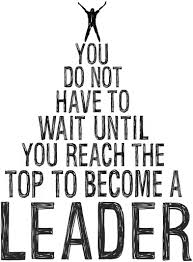 John Adair, an expert, author and consultant on leadership writes: “You can be appointed a ruler, governor, commander, or manager, but you are not a leader until your appointment is ratified in the hearts and minds of those under you”.
John Adair, an expert, author and consultant on leadership writes: “You can be appointed a ruler, governor, commander, or manager, but you are not a leader until your appointment is ratified in the hearts and minds of those under you”.
Over the years you may have heard that one automatically becomes a leader when they become responsible for a group of people. We know from experience that this is not always true. Being in a leadership position does not automatically win you the respect or loyalty of your team. A leadership position on an org chart may be an indicator that someone has some leadership skills, but it by no means a guarantee. Think about it, if the title were taken away, would the respect and loyalty disappear as well? If so, this is referred to as “position power” and not leadership.
There have been a many times when I have seen leadership qualities in team members who have no manager authority. They simply do their job and they naturally inspire and engage others to join them in the cause. They embody those characteristics that make a good leader, like trust, honesty, motivation and effective communication. They have skills that engage others with or without a position or title.
After coaching many individuals and leading workshops on leadership, I have been asked many questions about what is leadership. Here are some characteristics of what I believe leadership is and what it is not.
- Accountability: Leadership is about being accountable and responsible. Leaders take more of their share of the blame when things go wrong, and less than their share of credit for success. Leadership is not about taking all the credit or deflecting personal responsibility.
- Action: It is about doing the right thing, not about saying the right thing.
- Collaboration: Leadership is not about doing everything yourself. Leaders bring people together to find the answers through collaboration. The best leaders know they can’t achieve their goals alone—they need the right people doing the right things. Leadership is not about having all the answers.
- Communication: Great leaders listen more than they speak. They know that the most basic of all human needs is the need to be understood. The best way to understand people is to listen to what they say. Leadership is not about doing all the talking, which includes interrupting or speaking over others.
- Confidence: Like everyone else, leaders aren’t always confident. They may at times be uncertain or have doubts. Leaders are strongest when they demonstrate transparency and vulnerability—traits that equal truth and courage. Leadership is not about faking confidence which results in inauthentic behavior.
- Ego: It’s about inspiring and empowering followers, and other team members. It’s not about a title.
- Integrity: Leadership will always be focused on treating others fairly and with respect. Leadership is not about demeaning others, talking down to people or disrespecting people who make a mistake. Leaders don’t alienate, they encourage.
- Power: The most powerful leaders are those who earn trust and stay trustworthy. Leadership is about leading people with character and engendering trust. It is not about acquiring and using power to control people.
- Teach: Great leaders guide, mentor and coach people and inspire them to act. Leadership is not about telling, controlling and manipulating.
Real leadership requires personal influence earned from a long track record of strong relationships built by trust. That reserve of trust may have been built by any number of things, including the Executive Presence characteristics like authenticity, competence, confidence, communication skills, courage, decisiveness, emotional intelligence, integrity, and vision.
Think about these leadership qualities in yourself and those around you. Which leadership qualities do you have now? Which ones would you like to improve?
Becoming more effective as a leader requires the development of skills and the acquisition of approaches that increase your leadership effectiveness. If you want to develop the skills to improve your leadership, contact us. We specialize in equipping our future leaders with the right stuff.

Leave a Reply